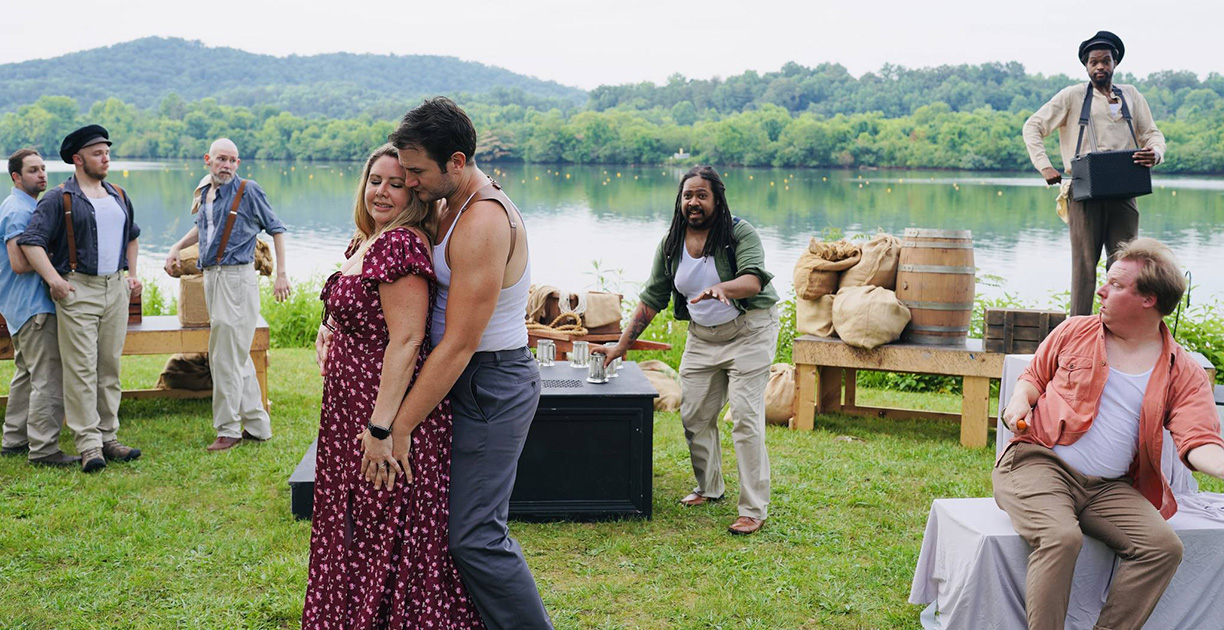Roughly a year ago, Marble City Opera updated its claim in the site-suggestive and outdoor operatic production categories with a very notable take on Carlisle Floyd’s Susannah staged in the atmospheric field and woods environment of Marble Springs State Historical Site in South Knox County. This was not the first such staging for MCO, for it followed outdoor productions of Puccini’s Suor Angelica in 2019 and Tosca in 2021 at St. John’s Episcopal Cathedral in downtown Knoxville. For 2024, the opera company has literally doubled down on its previous efforts, this time with two performances at two different locations. The chosen work was Puccini’s Il Tabarro (The Cloak) and the chosen locations were those that might suggest a dockside setting on Paris’ River Seine. Although the Tennessee River and its tributaries are rarely mistaken for the Seine, this atmospheric riparian adventure worked attractively, and even seductively, at the two locations: the Sequoyah Birthplace Museum on the Little Tennessee River in Vonore on Friday and the Melton Lake Park in Oak Ridge on Sunday. While the audiences at the two locations differed in quantity, both were enraptured by a cast of superb singers in one of Puccini’s least performed, but most relatable operas.

Of course, Il Tabarro is one of three one-act operas along with Suor Angelica and Gianni Schicchi that comprise the triptych Il Trittico that was first performed by the Metropolitan Opera in 1918. The work is a classic example of a love triangle tragedy in which a handsome, but penniless stevedore, Luigi (tenor Edward Brennan) has fallen for the beautiful young wife, Giorgetta (soprano Kathryn Frady) of an older barge owner, Michele (baritone Jacob Lasseter). The metaphoric title derives from the fact that Michele used to romantically wrap Giorgetta in his cloak, but that garment has now come to represent their loveless marriage and her yearning for something more.
As the sensually and romantically torn Giorgetta, Frady was superb in her gentle portrayal of the put-upon wife. Especially impressive for her sweetly-edged vocal performance, Frady’s performance was perhaps the most perfectly matched and effortlessly entrancing one I’ve heard from her to date. [Frady is the executive artistic director of Marble City Opera.] Tenor Brennan, as Luigi, was equally impressive, offering a handsome and romantic figure and a powerful, yet lyrical, vocal delivery that soared through the extremes of the role.

Playing the villain was nothing new for baritone Lassiter, having made a feast of the evil Scarpia in MCO’s Tosca. Lassiter’s baritone is rich and moody, the perfect vehicle for Michele’s latent evilness, which in fact, oozes from him, to the audience’s gruesome delight, in the opera’s finale.

Director Marya Barry wove the action of the leads and secondary roles into a suggestive tapestry of the rough life of dockworkers. Making a big impression in the secondary role of Frugola was Ema Metrovic, recently seen in MCO’s The Doctor and the Devils. Her range as a mezzo-soprano is extraordinary. Here, her Frugola, the ragpicker, riveted one’s attention with sympathetic warmth and humor, backed up with her luscious vocal portrayal. Frugola’s old husband and stevedore, Talpa, was beautifully handled by baritone Maurice Hendricks. Stevedore Tinca (Chris Plaas) was clearly enamored of the drink. The song-seller was sung by Breyon Ewing; Elena Klein and Tim Pope were the wandering lyrical lovers.
Conductor Andy Anderson, returning to Marble City Opera from last season’s Susannah, balanced pacing against the atmosphere of Puccini’s score to paint a descriptive underpinning to the tragedy with the 18-member instrumental ensemble that was situated just to side of the action at both locations.
Perhaps the only thing missing from this production of Il Tabarro was darkness, the 7 PM start time in the waning days of June forcing the viewer, like in the Shakespearean theatre, to use their imagination in a tale where striking a match is a major motivation. Of course, using an outdoor setting as a character in operatic production opens a substantial new chapter that offers new opportunities, but will inevitably reveal new staging challenges. As said before, those new to the outdoors experience will enjoy the atmospheric immersion that simply isn’t present in indoor drama and music.








